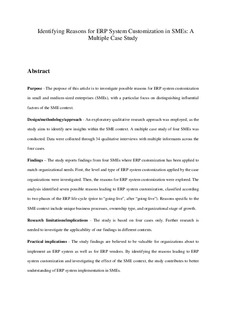| dc.contributor.author | Zach, Ondrej | |
| dc.contributor.author | Munkvold, Bjørn E. | |
| dc.date.accessioned | 2013-01-28T12:16:13Z | |
| dc.date.available | 2013-01-28T12:16:13Z | |
| dc.date.issued | 2012 | |
| dc.identifier.citation | Zach, O., & Munkvold, B. E. (2012). Identifying reasons for ERP system customization in SMEs: a multiple case study. Journal of Enterprise Information Management, 25(5), 462-478. doi: 10.1108/17410391211265142 | no_NO |
| dc.identifier.issn | 1741-0398 | |
| dc.identifier.uri | http://hdl.handle.net/11250/136312 | |
| dc.description | Author's version of an article in the journal: Journal of Enterprise Information Management. Also available from the publisher at: http://dx.doi.org/10.1108/17410391211265142 | no_NO |
| dc.description.abstract | Purpose – The purpose of this paper is to investigate possible reasons for enterprise resource planning (ERP) system customization in small and medium-sized enterprises (SMEs), with a particular focus on distinguishing influential factors of the SME context.
Design/methodology/approach – An exploratory qualitative research approach was employed, to identify new insights within the SME context. A multiple case study of four SMEs was conducted. Data were collected through 34 qualitative interviews with multiple informants across the four cases.
Findings – The paper reports findings from four SMEs where ERP customization has been applied to match organizational needs. First, the level and type of ERP system customization applied by the case organizations were investigated. Then, the reasons for ERP system customization were explored. The analysis identified seven possible reasons leading to ERP system customization, classified according to two phases of the ERP life-cycle (prior to “going-live” and after “going-live”). Reasons specific to the SME context include unique business processes, ownership type, and organizational stage of growth.
Research limitations/implications – The study is based on four cases only. Further research is needed to investigate the applicability of the findings in different contexts.
Practical implications – The study findings are believed to be valuable for organizations about to implement an ERP system, as well as for ERP vendors. By identifying the reasons leading to ERP system customization and investigating the effect of the SME context, the study contributes to a better understanding of ERP system implementation in SMEs.
Originality/value – The paper contributes to the scarce literature on reasons for ERP system customization in SMEs. By classifying the reasons into two phases of the ERP life-cycle, the study also contributes by exploring ERP system customization practice in different phases of the ERP life-cycle. | no_NO |
| dc.language.iso | eng | no_NO |
| dc.publisher | Emerald | no_NO |
| dc.subject | enterprise resource planning | no_NO |
| dc.subject | ERP implementation | no_NO |
| dc.subject | customization | no_NO |
| dc.subject | SME | no_NO |
| dc.subject | Czech Republic | no_NO |
| dc.subject | resource management | no_NO |
| dc.title | Identifying reasons for ERP system customization in SMEs: a multiple case study | no_NO |
| dc.type | Journal article | no_NO |
| dc.type | Peer reviewed | no_NO |
| dc.subject.nsi | VDP::Social science: 200::Economics: 210 | no_NO |
| dc.subject.nsi | VDP::Social science: 200::Library and information science: 320::Information and communication systems: 321 | no_NO |
| dc.source.pagenumber | 462-478 | no_NO |
| dc.source.volume | 25 | no_NO |
| dc.source.journal | Journal of Enterprise Information Management | no_NO |
| dc.source.issue | 5 | no_NO |
| dc.identifier.doi | 10.1108/17410391211265142 | |
